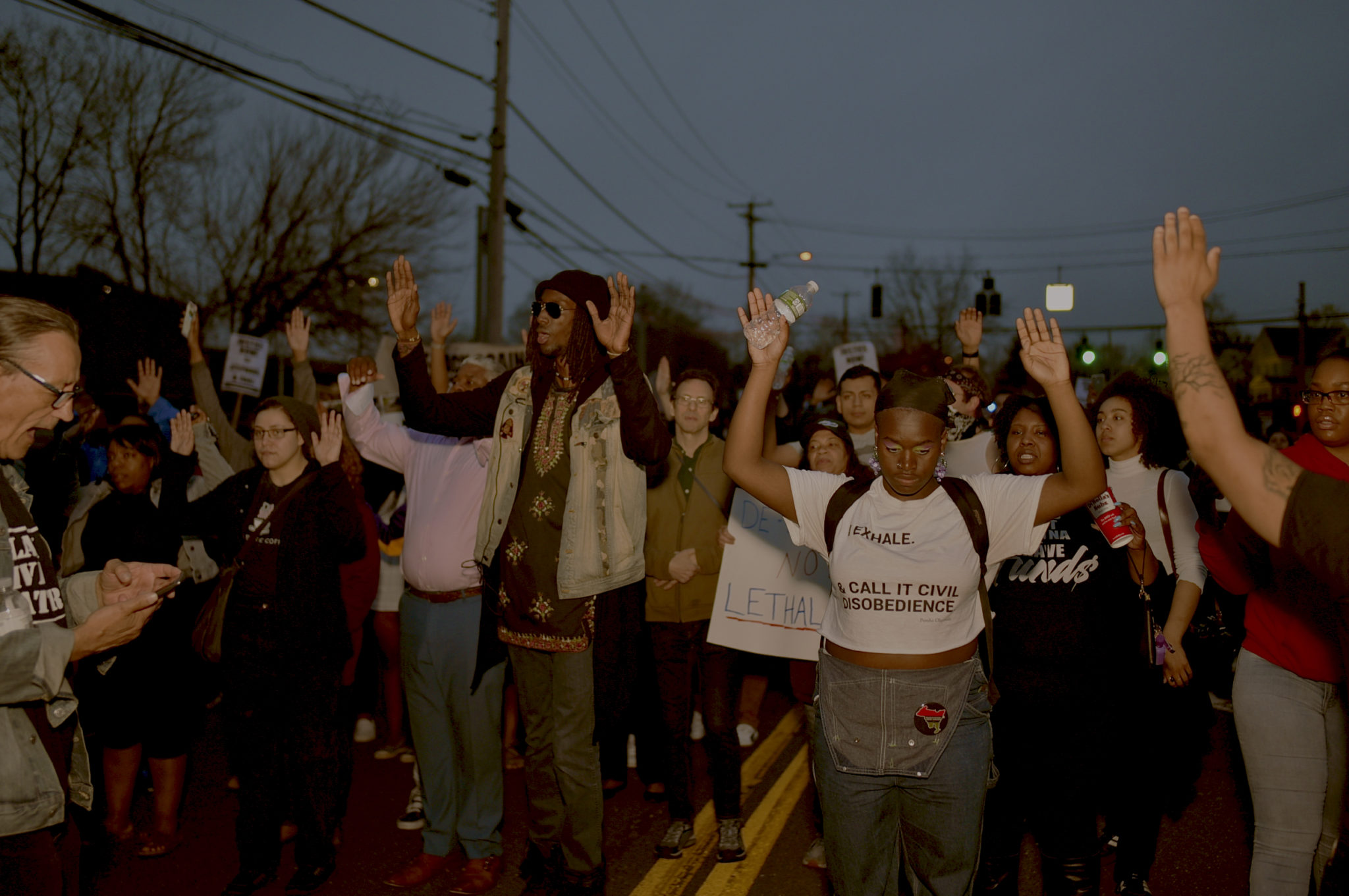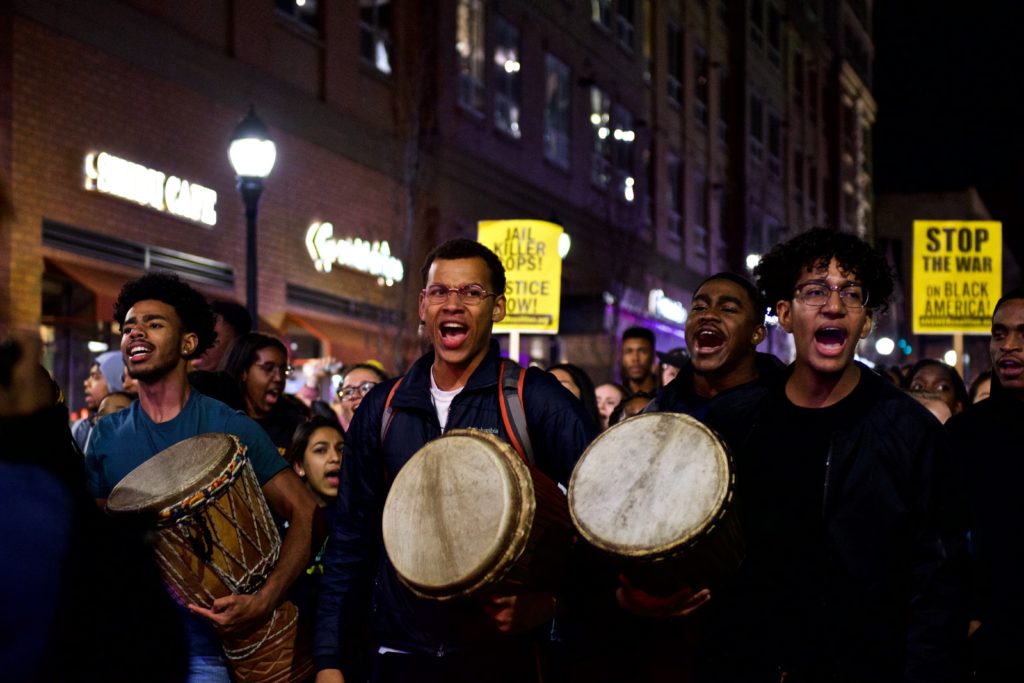
The morning of April 16, 2019, Hamden police officer Devin Eaton and Yale police officer Terrance Pollock fired multiple rounds at Stephanie Washington and Paul Witherspoon — both of whom were unarmed — during a traffic stop, leading to months of protest about the incident itself and policing in New Haven more broadly.
Around 4:19 a.m., Hamden police responded to a 911 call reporting an attempted robbery in Hamden, and Eaton and Pollock initiated a traffic stop on Argyle Street near Dixwell Avenue in New Haven. During the interaction, both officers fired at the car, injuring Washington. Pollock was grazed by a stray bullet from Eaton’s gun. Activists from New Haven, Hamden and Yale immediately called for the two departments to investigate and fire the officers involved. In October, the state charged Eaton with one count of assault and two counts of reckless endangerment, and Hamden’s police chief recommended his firing. Eaton pled not guilty to all charges and currently awaits trial while on leave from HPD. Pollock was suspended from YPD for one month in December and ultimately reassigned to desk duty.
While organizers view Eaton’s charges and Pollock’s reassignment as small victories, they have continually criticized the investigative process as slow, bureaucratic and insufficient — and have noted that months passed between the shooting and substantive official action. They have also issued larger calls for police accountability in New Haven and Connecticut, continuing advocacy efforts that have existed for decades in the Elm City and beyond.
“I think we all built, during this time, the foundation for a relationship rooted in solidarity,” People Against Police Brutality organizer Kerry Ellington told the News in an April 14 interview. “I think all the different communities that were involved wanted to — and still want to — see an end goal where both officers are held accountable for their reckless actions on April 16 of last year.”

Organizing around the shooting began immediately. The night of April 16, community activists gathered at Hamden police headquarters and on Dixwell Avenue to demand both officers’ termination and the release of body camera footage. After a series of public protests and meetings over the next two days, hundreds of Yalies and New Haven residents shut down several major streets on April 18 in a seven-hour rally aimed at Yale officials. Activists demanded that the University immediately fire Pollock, who had been placed on administrative leave.
After a week of public pressure, the state released available body camera footage, which included a partial capture from Eaton’s camera and mic, and nothing from Pollock, who failed to turn on his equipment. In total, the officers fired 16 shots at Witherspoon and Washington. Eaton fired 13 of the shots, while Pollock fired three.
Yalies have been heavily involved in organizing efforts. Student leaders from the Afro-American Cultural Center and other groups on campus have collaborated with local organizers to push for action from city and University officials.
“It wasn’t just another protest,” Black Men’s Union Community Outreach Chair Jaelen King ’22 told the News. “People were just really open and receptive to building relationships [and] coming together for something that was bigger than us.”
In the wake of the shooting, students affiliated with various Af-Am groups and other spaces formed Black Students for Disarmament at Yale, which aimed to support community organizing efforts.
Those efforts have focused in part on what activists see as over-policing in the Elm City. In the fallout of last April’s shooting, organizers criticized Hamden and Yale police for responding to a situation in New Haven — outside of Hamden’s jurisdiction and far from Yale’s campus. Many have called for restricting the jurisdiction of Yale police to the University’s immediate campus and buildings.
“We have a situation where we have a police department for the city of New Haven and we also have two additional police departments that can come in and police New Haven,” Ellington told the News in an October interview. “We call that a triple occupation.”
State’s Attorney Patrick Griffin’s report explicitly stated that the legal reach of Yale’s police department matches that of New Haven municipal police officers. The power of YPD officers is “not limited to Yale University campus or Yale University properties,” the report said.
Following the release of the report, Vice President for Human Resources and Administration Janet Lindner wrote in an email to the Yale community that the YPD was working with 21CP Solutions to “make recommendations on how Yale can improve police services.” 21CP Solutions is an organization that partners with police departments to “tackle the challenges of policing in the 21st century,” according to its website.
Griffin concluded his investigation of the shooting in October of last year. Per the recommendation of his report, Eaton received felony and misdemeanor charges. Griffin declined to recommend charges against Pollock. These decisions sparked continued protests as activists called for both officers to be terminated immediately. Organizers also fought for the matter to make the police commission’s agenda in the first place — the commission was not originally slated to discuss Eaton’s status in its first meeting following the state report release.
One month later, Hamden Police Chief John Cappiello recommended that Eaton be fired. The Hamden Police Department changed the status of Eaton’s leave from paid to unpaid, pending the outcome of his criminal case.
In December, Yale concluded its separate investigation of Pollock. The University placed him on 30 days of unpaid leave and allowed him return to the police department in an administrative position. Although they found this disciplinary action to be encouraging, student groups have continued their organizing efforts around police violence.
“The work towards disarmament does not end with one officer, and we will not allow this victory to make us think otherwise,” BSDxY wrote in a statement following Yale’s report. “Justice has not, and will not, be realized until these demands are met.”

As Eaton’s criminal case moves forward, campus and city activists have continued to collaborate on activism following last April’s shooting. Issues surrounding race and police violence in New Haven will continue to be the target of organizing efforts both at Yale and beyond.
The Yale Police Department was established in 1894.
Serena Lin | serena.lin@yale.edu






